比较级使用than的常见语法难点
比较级形容词或副词+than的用法归纳

比较级形容词或副词+than的用法归纳以下是小编为大家整理的比较级形容词或副词 + than用法总结,希望能帮助大家更好地认识比较级句型,提高英语水平。
You are taller than I.They lights in your room are as bright as those in mine.注意:1)要避免重复使用比较级。
(错) He is more cleverer than his brother.(对) He is more clever than his brother.(对) He is clever than his brother.2)要避免将主语含在比较对象中。
(错) China is larger that any country in Asia.(对) China is larger than any other countries in Asia.3)要注意对应句型,遵循前后一致的原则。
The population of Shanghai is larger than that of Beijing.It is easier to make a plan than to carry it out.4)要注意冠词的使用,后有名词的时候,前面才有可能有名词。
比较:Which is large, Canada or Australia?Which is the larger country, Canada or Australia?She is taller than her two sisters.She is the taller of the two sisters.--------------------------------------------------------------------------------------比较级形容词或副词 + than的用法归纳相关文章推荐:英语比较级和最高级的用法归纳初二英语下册语法知识点比较级和最高级的用法英语写作中怎样写简单句2015年山东省七下《暑假生活指导》答案完整版(2)高中英语作文常用句型。
比较级than的用法区别
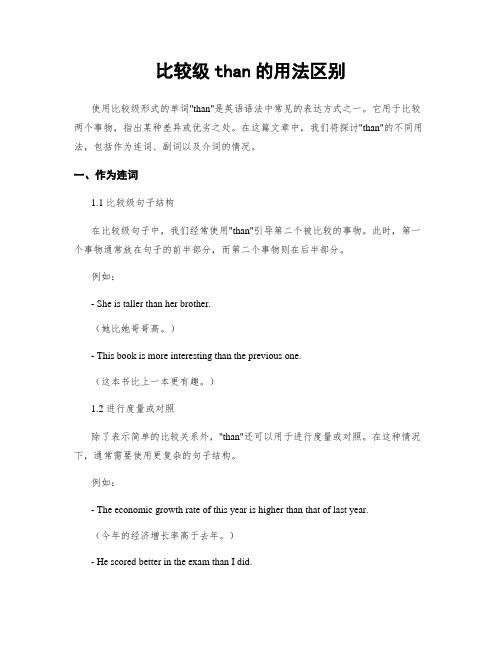
比较级than的用法区别使用比较级形式的单词"than"是英语语法中常见的表达方式之一。
它用于比较两个事物,指出某种差异或优劣之处。
在这篇文章中,我们将探讨"than"的不同用法,包括作为连词、副词以及介词的情况。
一、作为连词1.1 比较级句子结构在比较级句子中,我们经常使用"than"引导第二个被比较的事物。
此时,第一个事物通常放在句子的前半部分,而第二个事物则在后半部分。
例如:- She is taller than her brother.(她比她哥哥高。
)- This book is more interesting than the previous one.(这本书比上一本更有趣。
)1.2 进行度量或对照除了表示简单的比较关系外,"than"还可以用于进行度量或对照。
在这种情况下,通常需要使用更复杂的句子结构。
例如:- The economic growth rate of this year is higher than that of last year.(今年的经济增长率高于去年。
)- He scored better in the exam than I did.(他在考试中得分比我高。
)二、作为副词除了做连词外,"than"还可以充当副词来修饰形容词或副词,并进一步加强比较的程度。
在这种情况下,"than"通常放置在被修饰词之前。
例如:- The weather today is colder than yesterday.(今天的天气比昨天更冷。
)- She spoke more confidently than her partner.(她说话比她的伙伴更有信心。
)三、作为介词此外,"than"还可以作为介词出现在句子中,引导介词短语。
than的十个难点用法(二)

than的十个难点用法(二)六、后接时间或条件状语从句若语义需要,有时其后可接when引导的时间状语从句以及if 引导的条件状语从句。
如:You are a little fatter than when I saw you last. 你比我上次见你时胖点了。
Joe carries only nine pounds more than when he was twenty. 乔比他20岁时只重了九磅。
They work better together than if they are alone. 他们一起干比他们单干效果要好。
七、同质比较还是异质比较than 通常用于两个不同的人或物在同一方面进行比较,但有时指的可能是同一个人或物在两个不同的方面进行比较,此时只用于more…than…结构,而不能用–er…than…的形式(即使是单音节也是如此),这类结构通常可译为“与其……不如……”“有……无……”。
如:He’s more fat than sh ort. 与其说他矮不如说他胖。
They are more brave than wise. 他们有勇无谋。
If we tell him about it, it may do more harm than good. 倘若我们把情况告诉他,那可能弊多利少。
八、与never (a) 连用时如何理解有时than与带有never (a) 的比较级结构连用,表示强调,通常表示最高级的含义。
如:I’ve never had a worse morning than today. 我哪一天早上也不像今天早上这样倒霉。
若意思明确,有时可省略than结构。
如:He is fine, never better. 他很好,比以往任何时候都好。
I’ve never seen a finer bird. 我从未见过比这更美的鸟。
I’ve never found a better job. 这是我找到的最好的工作。
than语法
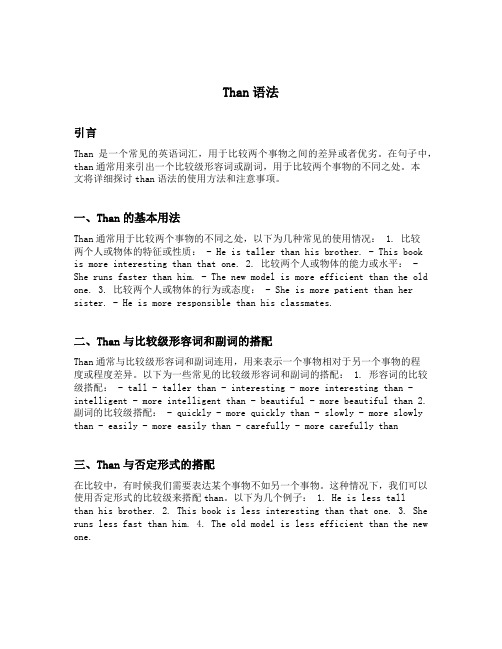
Than语法引言Than是一个常见的英语词汇,用于比较两个事物之间的差异或者优劣。
在句子中,than通常用来引出一个比较级形容词或副词,用于比较两个事物的不同之处。
本文将详细探讨than语法的使用方法和注意事项。
一、Than的基本用法Than通常用于比较两个事物的不同之处,以下为几种常见的使用情况: 1. 比较两个人或物体的特征或性质: - He is taller than his brother. - This book is more interesting than that one. 2. 比较两个人或物体的能力或水平: - She runs faster than him. - The new model is more efficient than the old one. 3. 比较两个人或物体的行为或态度: - She is more patient than her sister. - He is more responsible than his classmates.二、Than与比较级形容词和副词的搭配Than通常与比较级形容词和副词连用,用来表示一个事物相对于另一个事物的程度或程度差异。
以下为一些常见的比较级形容词和副词的搭配: 1. 形容词的比较级搭配: - tall - taller than - interesting - more interesting than - intelligent - more intelligent than - beautiful - more beautiful than 2. 副词的比较级搭配: - quickly - more quickly than - slowly - more slowly than - easily - more easily than - carefully - more carefully than三、Than与否定形式的搭配在比较中,有时候我们需要表达某个事物不如另一个事物。
than的详细用法

Than的详细用法一、Than的基本含义Than是一个英语连词,表示比较或比的对象,它主要用来比较两个不同的事物或概念。
它的含义在于突出两者的差异性或比较关系,通常在句子中连接两个不同的主语或宾语。
二、Than在比较结构中的用法●比较结构的基本形式在英语中,比较结构通常由“比较级 + than”构成,其中than用来连接两个比较对象。
例如:●He is taller than me. (他比我高。
)●This book is more interesting than that one. (这本书比那本书更有趣。
)省略形式在某些情况下,than后面可以省略一些句子成分,只留下比较级的词,这样的结构也能表达出比较的意思。
例如:●He is more athletic than me. (他比我更擅长运动。
)●She sings better than he does. (她唱得比我好。
)三、Than与Other, Else等词的区别●Other: Other常常用来表示“其他的”,与than没有直接的关系。
例如:●I have other books to read. (我有其他的书要看。
)Else: Else通常用于表示“其他的”,与than也没有直接的关系。
例如:●What else do you want to know? (你还想知道什么其他的?)四、Than在固定搭配中的使用●比较级 + than + 不定代词:这种结构表示某个事物的某个方面超过其他事物。
例如:●She has more money than anyone else. (她比其他任何人都有钱。
)比较级 + than + 副词:这种结构用于表示比较关系,通常放在动词后面。
例如:●She studies harder than ever before. (她比以前更加努力地学习。
)倍数 + 比较级 + than:这种结构用于表示某事物是另一事物的几倍大小或程度。
than的用法归纳总结 (2)

than的用法归纳总结一、Than的基本用法概述Than是一个常见的比较词,用于表达两个或多个事物之间的比较关系。
在英语中,Than既可以作为连词使用,连接两个句子,也可以作为介词使用,在句子当中引导一个比较短语。
本文将对Than的用法进行归纳总结。
二、Than作为连词的用法1. 比较级在表示"某事物胜过另一事物"的比较结构中,我们常使用than来连接两个句子,并且在第二个谓语动词前使用形容词或副词的比较级。
例如:- She is taller than her sister.- I eat more vegetables than fruits.2. 从属连词Than也可作为从属连词引导一个子句,在该从句中表达一个与主句相对或对立的情况。
这种情况下,我们通常用不同程度的形容词或副词来表示差异。
例子:- He works harder than I do.(他工作得比我努力。
)3. no sooner…thanThan还可以与no sooner搭配使用,表示某件事情刚刚发生就紧接着发生了下一件事情。
例如:- No sooner had she finished her speech than she left the stage.4. rather…than当我们要表达两个选择时,我们常常使用rather...than结构来表示对第一个选择的偏好。
例子:- I would rather stay at home and watch a movie than go out in the rain.三、Than作为介词的用法1. 比较短语Than也可以作为介词使用,引导一个比较短语,用于比较两个事物之间的差异或进行评估。
例如:- She is older than me.- This book is more expensive than that one.2. Rather thanThan还可以和rather连用,表示对某种情况或选择的偏好。
than的语法知识

than的语法知识Than的语法知识Than是一个常见的比较词,用于进行比较,表示一个事物相对于另一个事物的优劣或差异。
在语法中,than通常用于比较两个物体、人或概念之间的差异。
下面将介绍一些关于than的语法知识。
1. than的用法than通常用于表示比较两个事物之间的差异。
它可以和形容词、副词、名词或动词连用。
在比较级中,than用于连接两个要进行比较的事物,表示后者相对于前者的优劣或差异。
例如:- She is taller than her sister.(她比她姐姐高。
)- He runs faster than me.(他跑得比我快。
)2. than的位置than通常紧跟在比较级形容词或副词之后,用于连接两个要进行比较的事物。
例如:- He is smarter than his classmates.(他比他的同学聪明。
)- She sings better than her friend.(她唱得比她的朋友好。
)3. than的否定形式当要表示两个事物在某一方面没有差异时,可以使用not...than的形式。
例如:- This book is not more expensive than that one.(这本书并不比那本书贵。
)- I don't like him any less than you do.(我和你一样不喜欢他。
)4. than的使用注意事项- 在比较级中,than用于表示后者相对于前者的优劣或差异。
如果要表示两个事物在某一方面相同,则使用as...as结构。
例如:- He is as tall as his brother.(他和他的兄弟一样高。
)- This car is as fast as that one.(这辆车和那辆车一样快。
)- 当比较的两个事物具有相同的特征时,可以使用more...than的形式。
例如:- She is more beautiful than ever.(她比以前更漂亮。
(完整版)比较级Than后面用宾格还是主格
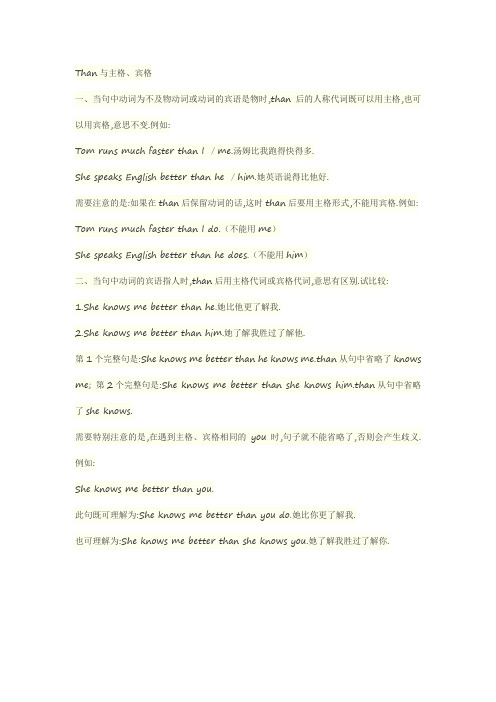
Than与主格、宾格
一、当句中动词为不及物动词或动词的宾语是物时,than后的人称代词既可以用主格,也可以用宾格,意思不变.例如:
Tom runs much faster than I /me.汤姆比我跑得快得多.
She speaks English better than he /him.她英语说得比他好.
需要注意的是:如果在than后保留动词的话,这时than后要用主格形式,不能用宾格.例如: Tom runs much faster than I do.(不能用me)
She speaks English better than he does.(不能用him)
二、当句中动词的宾语指人时,than后用主格代词或宾格代词,意思有区别.试比较:
1.She knows me better than he.她比他更了解我.
2.She knows me better than him.她了解我胜过了解他.
第1个完整句是:She knows me better than he knows me.than从句中省略了knows me; 第2个完整句是:She knows me better than she knows him.than从句中省略了she knows.
需要特别注意的是,在遇到主格、宾格相同的 you时,句子就不能省略了,否则会产生歧义.例如:
She knows me better than you.
此句既可理解为:She knows me better than you do.她比你更了解我.
也可理解为:She knows me better than she knows you.她了解我胜过了解你.。
than的用法小结

than的用法小结一、than的基本意思和用法Than是一个常见的英语单词,主要用作介词、连词或副词。
它和比较级形容词或副词一起使用,表达“比……更”这样的比较关系。
接下来将从不同的角度总结than的用法。
1. 作为介词当than被用作介词时,其后通常跟随一个名词短语或动名词短语,并表示一种比较关系。
例如:- She is taller than her sister.(她比她姐姐高。
)- He earns more money than his colleagues.(他赚的钱比他的同事多。
)2. 作为连词当than被用作连词时,它连接两个分句,引出一个比较级形式。
例如:- She is smarter than I am.(她比我聪明。
)- He works harder than his coworkers.(他工作比同事们更努力。
)3. 表示时间顺序有时候,than可以表示时间上的先后顺序,相当于“然后”。
例如:- First, cook the pasta, than add the sauce.(首先,煮面条,然后加酱汁。
)二、其他常见表达方式除了基本意义以外,than在某些情况下还有额外用法。
1. no sooner...than...这个短语结构用于表示“刚……就……”。
例如:- No sooner had I sat down than the phone rang.(我刚一坐下,电话就响了。
)2. other than这个短语意思是“除了……之外”,常常用来介绍一个例外情况。
例如:- She doesn't have any hobbies other than reading.(除了阅读,她没有其他的爱好。
)3. rather than这个短语相当于instead of,意为“而不是”。
例如:- I would prefer tea rather than coffee.(我更喜欢茶而不是咖啡。
比较级than的用法

比较级than的用法一、什么是比较级than及其概念在英语中,我们可以用比较级来对两个事物进行比较,表示一个事物相对于另一个事物的程度或大小差异。
而"than"则是用来引出被比较的对象。
通过使用"than",我们可以清晰地表达出两者之间的关系,并在语言中引入了一种相对性。
二、比较级than的基本结构和使用1. 结构要构成比较级,我们需要在形容词前加上-er或在形容词前面加上more,并以than连接被比较的事物。
例如:- He is taller than his brother.- English is more popular than French.2. 使用- 比较级可用来与不同种类或相同种类的两个人或事物进行比较。
例子:Lions are faster than tigers.(狮子跑得比老虎快。
)My sister sings better than me.(我妹妹唱歌比我好听。
)- 比较级还可以描述单一事物的变化。
例子:I feel better today than I did yesterday.(今天我觉得比昨天好。
)The weather is warmer now than it was earlier this week.(现在的天气比这周早些时候暖和。
)三、常见误区和注意事项1. 形容词与than的搭配值得注意的是,由于语境不同,形容词有时需要使用原级而非比较级,或直接使用than引出被比较对象。
例子:I am less tired than you.(我比你不那么累。
)He is taller than anyone in his family.(他比家里任何人都高。
)2. 强调和肯定句当我们想强调一个事物在某方面特别突出时,可以使用"The + 比较级 + S, the + 比较级 + S"的结构。
例子:The more she practices, the better she gets at playing piano.(她练习越多,弹钢琴就越好。
比较级使用than的常见语法难点

一、后接人称代词用主格还是宾格由于than既可用作连词也可用作介词,所以当后接人称代词时,可用主格也可用宾格。
通常认为在正式文体中多用主格,在口语或非正式文体中多用宾语。
如:Everyone here is taller than I [me]. 这儿的每一个人都比我高。
Her sister swims faster than she [her]. 她姐姐游泳比她快。
但是,若人称代词之后跟有动词,则只能用主格。
如:Everyone here is taller than I am. 这儿的每一个人都比我高。
Her sister swims faster than she does. 她姐姐游泳比她快。
注意:有时用主格或宾格会导致意思的变化。
比较:I love you more than he (likes you). 我比他更爱你。
I love you more than (he likes) him. 我爱你胜过爱他。
二、后接动词用不定式还是动名词1. 当连接两个非谓语动词时,通常应使用一样的形式。
如:It is much easier to get into debt than to get out of it. 借债容易还债难。
He likes playing chess more than watching TV. 与看电视相比,他更喜欢下棋。
比较:He thinks it is safer to drive himself than (to) let me drive.=He thinks that driving himself is safer than letting me drive. 他认为他自己开车比让我开车要更安全些。
2. 若不是连接两个非谓语动词,则其后出现的动词通常用动名词形式(虽然也可用不定式,但不如用动名词普通)。
如:There are worse calamities than failing your driving test. 比起你驾驶考试不合格来说,更大的灾难还多着呢。
【最新2019】使用than的常见语法难点-范文模板 (2页)
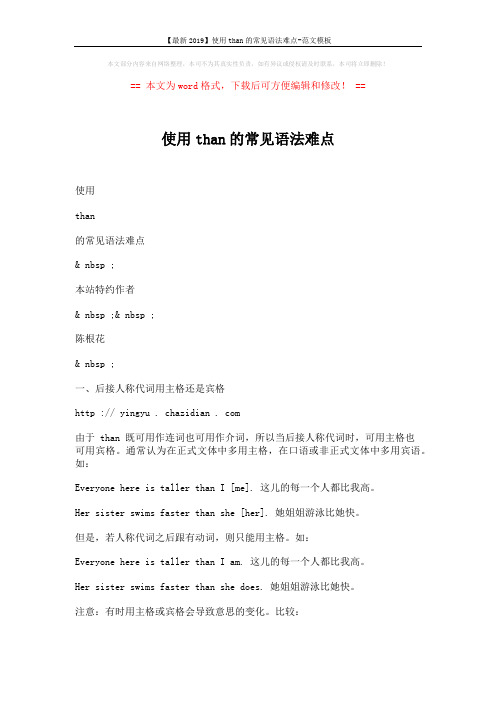
【最新2019】使用than的常见语法难点-范文模板
本文部分内容来自网络整理,本司不为其真实性负责,如有异议或侵权请及时联系,本司将立即删除!
== 本文为word格式,下载后可方便编辑和修改! ==
使用than的常见语法难点
使用
than
的常见语法难点
& nbsp ;
本站特约作者
& nbsp ;& nbsp ;
陈根花
& nbsp ;
一、后接人称代词用主格还是宾格
http :// yingyu . chazidian . com
由于 than 既可用作连词也可用作介词,所以当后接人称代词时,可用主格也
可用宾格。
通常认为在正式文体中多用主格,在口语或非正式文体中多用宾语。
如:
Everyone here is taller than I [me]. 这儿的每一个人都比我高。
Her sister swims faster than she [her]. 她姐姐游泳比她快。
但是,若人称代词之后跟有动词,则只能用主格。
如:
Everyone here is taller than I am. 这儿的每一个人都比我高。
Her sister swims faster than she does. 她姐姐游泳比她快。
注意:有时用主格或宾格会导致意思的变化。
比较:。
比较级than的用法讲解学习

比较级t h a n的用法比较级:使用than的常见语法难点一、后接人称代词用主格还是宾格由于than既可用作连词也可用作介词,所以当后接人称代词时,可用主格也可用宾格。
通常认为在正式文体中多用主格,在口语或非正式文体中多用宾语。
如:Everyone here is taller than I [me]. 这儿的每一个人都比我高。
Her sister swims faster than she [her]. 她姐姐游泳比她快。
但是,若人称代词之后跟有动词,则只能用主格。
如:Everyone here is taller than I am. 这儿的每一个人都比我高。
Her sister swims faster than she does. 她姐姐游泳比她快。
注意:有时用主格或宾格会导致意思的变化。
比较:I love you more than he (likes you). 我比他更爱你。
I love you more than (he likes) him. 我爱你胜过爱他。
二、后接动词用不定式还是动名词1. 当连接两个非谓语动词时,通常应使用一样的形式。
如:It is much easier to get into debt than to get out of it. 借债容易还债难。
He likes playing chess more than watching TV. 与看电视相比,他更喜欢下棋。
比较:He thinks it is safer to drive himself than (to) let me drive.=He thinks that driving himself is safer than letting me drive. 他认为他自己开车比让我开车要更安全些。
2. 若不是连接两个非谓语动词,则其后出现的动词通常用动名词形式(虽然也可用不定式,但不如用动名词普通)。
than用法小结

than用法小结than是英语中的副词,有时也可以作为介词使用。
以下是than 的常见用法小结:1. 作为比较级的标志:- 在比较级中,than用来比较两个事物或人的不同之处,表示“比...更”或“与...相比”。
例如:He is taller than his brother.(他比他的兄弟更高。
)2. 引导从句:- than可以引导一个从句,用来表示一个相对的情况或比较。
例如:I’d rather stay at home than go out.(我宁愿呆在家里,也不愿出去。
)3. 引导表示近似数值的短语:- than用来引导一个短语,表示近似数值。
例如:It's ten minutes to six.(距离六点还有十分钟。
)4. 表示选择:- than用来表示一种选择或偏向,常与rather或prefer连用。
例如:I would rather go swimming than go shopping.(我宁愿去游泳,也不愿意去购物。
)5. 比较程度:- than可以用来表示比较程度,表示“比...更...”或“与...相比...”。
例如:She is more intelligent than you.(她比你更聪明。
)6. 在否定句中使用:- than可以用来在否定句中表示“不如”。
例如:She is no better than her sister.(她不如她的姐姐好。
)7. 与rather连用表示情感倾向:- than可以与rather连用,表示对某种情感的倾向或态度。
例如:I would rather die than give up.(我宁愿死也不愿放弃。
)8. than用于除了上述情况以外的其他场合:- than在英语中还有许多其他用法,如在hardly...than...(几乎不...就...)、other than(除了...以外)等。
总之,than作为副词和介词,有着丰富的用法。
than的用法归纳总结

than的用法归纳总结一、than的基本用法解析在英语中,than是一个常见且多功能的词汇。
它通常用来比较两个事物之间的差异、表达偏好或者作为连词。
本文将细致解析than的不同用法及其例句,以帮助读者更好地理解和运用这个词汇。
二、表示比较差异1. 比较级结构:当我们要比较两个事物或者人物之间的差异时,可以使用“than”后接形容词或副词。
例句:- He is taller than his brother.(他比他兄弟高。
)- This book is more interesting than the previous one.(这本书比之前那本书更有趣。
)2. 表示与期望相反:有时候我们会遇到一个情况,实际结果与我们期待的结果截然相反。
在这种情况下,我们可以使用“rather than”来表达出事物的真实状况。
例句:- I would have preferred tea rather than coffee.(我更喜欢茶而不是咖啡。
)- She chose to stay home rather than go to the party.(她选择待在家里而不是去参加派对。
)三、表述偏好1. like...rather than...当我们想要表达自己对某个事物的偏好时,我们可以使用“like...rather than...”这个结构。
例句:- I like cats rather than dogs.(我喜欢猫胜过狗。
)- She prefers to go hiking rather than swimming.(她喜欢远足胜过游泳。
)2. would rather...than...与前面类似,我们还可以使用“would rather...than...”来表达自己的偏好,但这里更强调一种愿望或选择。
例句:- I would rather stay at home than go out in the rain.(我宁愿呆在家里也不愿意外出遛雨。
比较级than的用法和句型
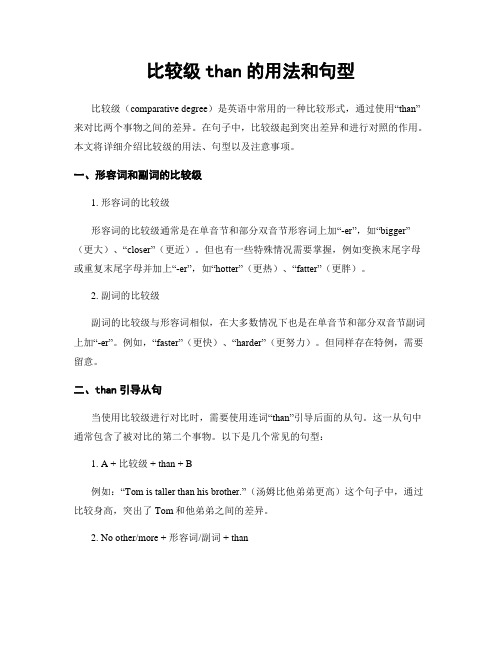
比较级than的用法和句型比较级(comparative degree)是英语中常用的一种比较形式,通过使用“than”来对比两个事物之间的差异。
在句子中,比较级起到突出差异和进行对照的作用。
本文将详细介绍比较级的用法、句型以及注意事项。
一、形容词和副词的比较级1. 形容词的比较级形容词的比较级通常是在单音节和部分双音节形容词上加“-er”,如“bigger”(更大)、“closer”(更近)。
但也有一些特殊情况需要掌握,例如变换末尾字母或重复末尾字母并加上“-er”,如“hotter”(更热)、“fatter”(更胖)。
2. 副词的比较级副词的比较级与形容词相似,在大多数情况下也是在单音节和部分双音节副词上加“-er”。
例如,“faster”(更快)、“harder”(更努力)。
但同样存在特例,需要留意。
二、than引导从句当使用比较级进行对比时,需要使用连词“than”引导后面的从句。
这一从句中通常包含了被对比的第二个事物。
以下是几个常见的句型:1. A + 比较级 + than + B例如:“Tom is taller than his brother.”(汤姆比他弟弟更高)这个句子中,通过比较身高,突出了Tom和他弟弟之间的差异。
2. No other/more + 形容词/副词 + than例如:“No other country is more beautiful than Switzerland.”(没有其他国家比瑞士更美)。
这样的句型用于强调某一事物在某方面的超群之处。
3. 形容词/副词(+ enough)+ to 是句型例如:“She is old enough to take care of herself.”(她已经足够大,可以自己照顾自己)。
这个句子中,“old enough”表示达到了能够独立自主的年龄。
4. the + 比较级 + of the two/three...例如:“This book is the most interesting of the three.”(这本书是三本书中最有趣的一本)。
比较结构小结+(历年重点考点)

使用than 的常见语法难点一、后接人称代词用主格还是宾格因为than既可用作连词也可用作介词,所以当后接人称代词时,可用主格也可用宾格。
通常认为在正式文体中多用主格,在口语或非正式文体中多用宾语。
如:Everyone here is taller than I [me]. 这儿的每一个人都比我高。
Her sister swims faster than she [her]. 她姐姐游泳比她快。
但是,若人称代词之后跟有动词,则只能用主格。
如:Everyone here is taller than I am. 这儿的每一个人都比我高。
Her sister swims faster than she does. 她姐姐游泳比她快。
注意:有时用主格或宾格会导致意思的变化。
比较:I love you more than he (likes you). 我比他更爱你。
I love you more than (he likes) him. 我爱你胜过爱他。
二、后接动词用不定式还是动名词1. 当连接两个非谓语动词时,通常应使用一样的形式。
如:It is much easier to get into debt than to get out of it. 借债容易还债难。
He likes playing chess more than watching TV. 与看电视相比,他更喜欢下棋。
比较:He thinks it is safer to drive himself than (to) let me drive.=He thinks that driving himself is safer than letting me drive. 他认为他自己开车比让我开车要更安全些。
三、than any other后接名词用单数还是复数than any other后接名词时通常用单数形式,很少用复数。
如:He swims faster than any other student in his class. 他比班上的其他任何学生都游得快。
比较级中than的用法
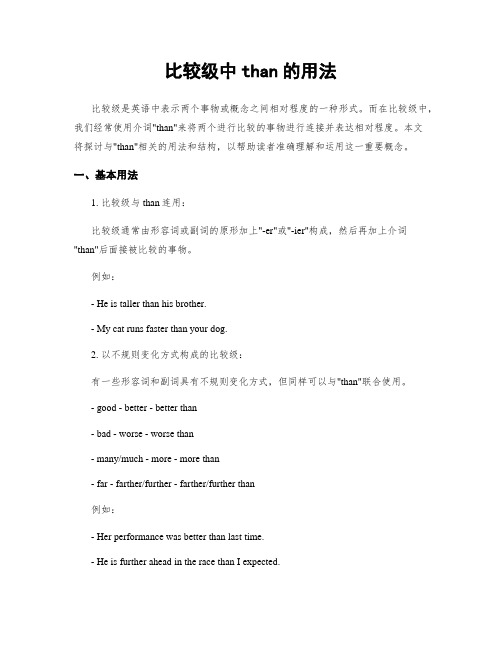
比较级中than的用法比较级是英语中表示两个事物或概念之间相对程度的一种形式。
而在比较级中,我们经常使用介词"than"来将两个进行比较的事物进行连接并表达相对程度。
本文将探讨与"than"相关的用法和结构,以帮助读者准确理解和运用这一重要概念。
一、基本用法1. 比较级与than连用:比较级通常由形容词或副词的原形加上"-er"或"-ier"构成,然后再加上介词"than"后面接被比较的事物。
例如:- He is taller than his brother.- My cat runs faster than your dog.2. 以不规则变化方式构成的比较级:有一些形容词和副词具有不规则变化方式,但同样可以与"than"联合使用。
- good - better - better than- bad - worse - worse than- many/much - more - more than- far - farther/further - farther/further than例如:- Her performance was better than last time.- He is further ahead in the race than I expected.3. "no more...than"/ "not any more...than"这一结构表示两个被比较的事物没有任何区别或差异。
例如:- He's no more intelligent than his classmates.(他并不比他的同学更聪明。
)二、比较级引申用法1. 表示两个事物共享相似的特征:"than"还可以用于连接两个具有相似或相同特征的事物,形成比较结构。
比较级Than后面用宾格还是主格(可编辑修改word版)

Than与主格、宾格
一、当句中动词为不及物动词或动词的宾语是物时,than后的人称代词既可以用主格,也可以用宾格,意思不变.例如:
Tom runs much faster than I /me.汤姆比我跑得快得多.
She speaks English better than he /him.她英语说得比他好.
需要注意的是:如果在than后保留动词的话,这时than后要用主格形式,不能用宾格.例如: Tom runs much faster than I do.(不能用me)
She speaks English better than he does.(不能用him)
二、当句中动词的宾语指人时,than后用主格代词或宾格代词,意思有区别.试比较:
1.She knows me better than he.她比他更了解我.
2.She knows me better than him.她了解我胜过了解他.
第1个完整句是:She knows me better than he knows me.than从句中省略了knows me; 第2个完整句是:She knows me better than she knows him.than从句中省略了she knows.
需要特别注意的是,在遇到主格、宾格相同的you时,句子就不能省略了,否则会产生歧义.例如:
She knows me better than you.
此句既可理解为:She knows me better than you do.她比你更了解我.
也可理解为:She knows me better than she knows you.她了解我胜过了解你.。
- 1、下载文档前请自行甄别文档内容的完整性,平台不提供额外的编辑、内容补充、找答案等附加服务。
- 2、"仅部分预览"的文档,不可在线预览部分如存在完整性等问题,可反馈申请退款(可完整预览的文档不适用该条件!)。
- 3、如文档侵犯您的权益,请联系客服反馈,我们会尽快为您处理(人工客服工作时间:9:00-18:30)。
一、后接人称代词用主格还就是宾格由于than既可用作连词也可用作介词,所以当后接人称代词时,可用主格也可用宾格。
通常认为在正式文体中多用主格,在口语或非正式文体中多用宾语。
如:Everyonehere is tallerthan I [me]、这儿得每一个人都比我高。
Her sister swims faster than she[her]、她姐姐游泳比她快。
但就是,若人称代词之后跟有动词,则只能用主格。
如:Everyone here is tallerthan I am、这儿得每一个人都比我高。
Her sister swimsfaster than shedoes、她姐姐游泳比她快。
注意:有时用主格或宾格会导致意思得变化。
比较:I loveyou more thanhe (likesyou)、我比她更爱您。
Ilove you more than (he likes)him、我爱您胜过爱她。
二、后接动词用不定式还就是动名词1、当连接两个非谓语动词时,通常应使用一样得形式。
如:Itismuch easier to getinto debt than to getout of it、借债容易还债难。
He likes playing chess more thanwatching TV、与瞧电视相比,她更喜欢下棋。
比较:He thinks it is saferto drive himselfthan(to) let me drive、=He thinksthat drivinghimself is saferthanletting medrive、她认为她自己开车比让我开车要更安全些。
2、若不就是连接两个非谓语动词,则其后出现得动词通常用动名词形式(虽然也可用不定式,但不如用动名词普通)。
如:There are worse calamitiesthan failing your drivingtest、比起您驾驶考试不合格来说,更大得灾难还多着呢。
Nothing givesme more pleasure than listeningto Mozart、再没有比听莫扎特得乐曲更让我高兴得事了。
Nothing is moreunpleasant than finding[tofind] insects in your bath、最使人不快得就是在浴室里发现有虫子。
三、引导比较状语从句得时态问题若than引导得比较状语从句与主句动作不一致,可以根据情况使用适当得时态形式。
如: He drivesfaster than he did a year ago、她开车比一年以前快了。
Thehouse is rather bigger than wethought、这所房子比我们想得大得多。
若主句为将来时,than引导得从句可用现在时态表示将来,也可直接使用将来时态。
如:We'll probably drive faster than you do[will]、我们开车可能会比您们快。
四、引导比较状语从句得倒装问题than引导比较状语从句时,从句语序通常不需倒装,但在正式文体中,有时也可倒装。
如: City dweller havea higherdeath rate thancountry people do、=City dweller have a higherdeath rate thandocountrypeople、城市居民死亡率比农村居民高。
五、引导比较状语从句且在从句中充当成分有时可引导一个从句并在从句中充当句子成分(主语、宾语、表语),为便于理解,有时可视为than后省略了what:We don't want to domorethan is necessary、我们不想做不必要得事情。
The pain was almostmore than he could bear、这样得痛苦几乎使她受不了。
She's notavery good managershe always spendsmoremoneythan sheearns、她不大会理财——总就是入不敷出。
Life hereis much easierthan itused to be、如今在此地生活比起从前可舒服多了。
比较下面一句,than后得expected为省略结构:He returned three days earlierthan(he was)expected、她回来得比预料得要早三天。
六、后接时间或条件状语从句若语义需要,有时其后可接when引导得时间状语从句以及if 引导得条件状语从句。
如:Youare a little fatter than when I sawyoulast、您比我上次见您时胖点了。
Joe carries only ninepounds more thanwhenhe was twenty、乔比她20岁时只重了九磅。
Theywork bettertogetherthanif they arealone、她们一起干比她们单干效果要好。
七、同质比较还就是异质比较than 通常用于两个不同得人或物在同一方面进行比较,但有时指得可能就是同一个人或物在两个不同得方面进行比较,此时只用于more…than…结构,而不能用–er…than…得形式(即使就是单音节也就是如此),这类结构通常可译为“与其……不如……”“有……无……”。
如:He's more fat than short、与其说她矮不如说她胖。
They aremore bravethan wise、她们有勇无谋。
If we tellhim about it,it may do more harmthangood、倘若我们把情况告诉她,那可能弊多利少。
八、与never (a)连用时如何理解有时than与带有never (a) 得比较级结构连用,表示强调,通常表示最高级得含义。
如:I'veneverhada worse morning thantoday、我哪一天早上也不像今天早上这样倒霉。
若意思明确,有时可省略than结构。
如:He isfine,never better、她很好,比以往任何时候都好。
I'veneverseen a finer bird、我从未见过比这更美得鸟。
I've neverfound abetterjob、这就是我找到得最好得工作。
九、thananyother后接名词用单数还就是复数than anyother后接名词时通常用单数形式,很少用复数。
如:Heswimsfaster than any otherstudent inhisclass、她比班上得其她任何学生都游得快。
More heat is lostthrough thehead thanany other partofthe body、从头部散发得热量比身体得其她任何部位都多。
十、几组容易理解出错得than习语1、“no+比较级+than”与“not+比较级+than”(1) “no +比较级+than”用于否定两者,表示“与……一样不”,其义大致相当于其中形容词或副词得反义词用于as…as…结构。
如:Heis no richerthan a beggar、=He isaspooras a beggar、她穷如乞丐。
This oneis no better than that one、=This one is as badas that one、这个与那个一样不好。
(2) “not+比较级+than”得意思就是“不比……更”“不如”。
如:He isnot richer than you、她不如您富有。
Thisone is not better thanthat one、这个不如那个好。
2、no less than, no less、、、than 与not less than(1)noless than有两个意思:一就是表示“多达”“有……之多”,强调数量之多;二就是表示“简直”“与……没有差别”。
如:We walked no less than three miles、我们走了三英里之远。
We won no lessthan£500 in a petition、我们在一次比赛中就赢了500英镑。
It isno lessthan robbery to ask for so much、要这么多,简直跟抢劫没什么两样。
(2) no less、、、than意为“与……一样”“不比……差”,强调两者具有同等性。
如:Heisno lesswise thanyou、她跟您一样聪明(她并不比您笨)。
A dolphin is no less a clever animal than a dog is、海豚与狗同样都就是聪明得动物。
(3) notless than 意为“不下于”“至少”。
比较:Hehasno less than sevendaughters、她有七个女儿之多。
He hasnot less than seven daughters、她至少有七个女儿。
3、no morethan, nomore…than与not more than(1)no morethan表示“仅仅”“只有”“只不过”,强调程度低或数量少。
如:He is nomore than anordinaryEnglish teacher、她只不过就是个普通得英文老师。
He has no more than three shirts、她只有3件衬衫。
(2) not morethan 表示“至多”,与at most同义。
如:He hasnot more than three shirts、她最多只有3件衬衫(含有或许还不到3件之意)。
(3) no more、、、than 表示对两者都否定,意为“既不……也不”“同……一样不”。
如: Heis nomore a writer than apainter、她既不就是画家,也不就是作家。
A whale is no more a fishthan a horse is、如同马不就是鱼一样,鲸也不就是鱼。
